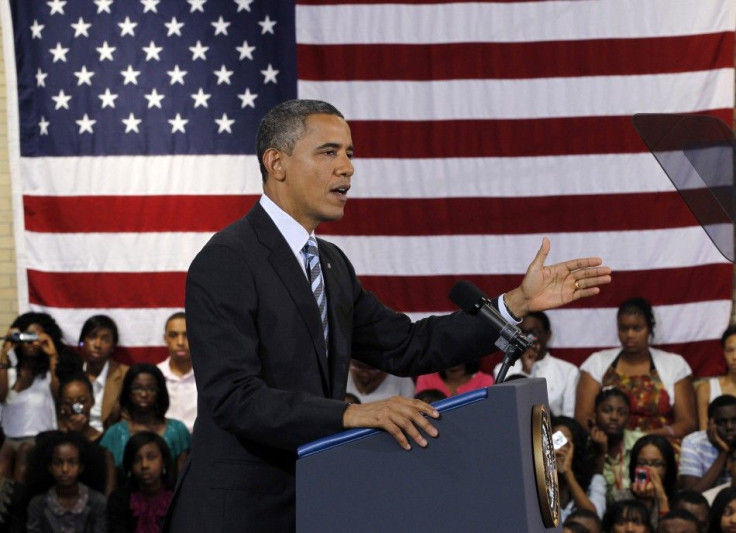Obama 2012: Can He Win Without Wall Street?
ANALYSIS

The Occupy Wall Street protests are fueled in part by the perception that the political process is corrupted by the influence of the financial industry, with the reliance on campaign contributions implicating both Republicans and Democrats.
Now, as he seeks to build momentum for what will likely be an arduous re-election campaign, President Barack Obama is signaling that he'll try to tap into a similar sentiment by distancing himself from Wall Street. The strategy marks a reversal from his attempts to woo back donors from the financial industry, who poured $71 million into his 2008 campaign.
Obama has stepped up his populist rhetoric as he canvasses for his jobs bill, telling crowds that it's imperative that everyone pays their fair share, including the wealthiest Americans and biggest corporations. The president has pushed hard to pay for the legislation by raising taxes on the wealthy, a demand that pervades Occupy Wall Street rallies.
Criticizes Bank's Debit Card Fee
He also offered unusually pointed criticism when Bank of America levied a monthly fee for debit card purchases. Bank of America introduced the fee in response to a measure in the Dodd-Frank financial reform bill that reduced the amount banks could charge for debit card transactions, a provision that the financial industry unsuccessfully fought with an aggressive lobbying campaign.
This is exactly why we need somebody whose sole job it is to prevent this kind of stuff from happening, Obama told ABC's George Stepanopolous in an allusion to the Consumer Financial Protection Agency established by the Dodd-Frank bill. He criticized the notion that banks have some inherent right just to, you know, get a certain amount of profit.
Obama plans to tout his role in passing the Dodd-Frank bill throughout the campaign. His campaign advisers hope that will resonate with voters still angry about what they see as Wall Street excesses -- while Obama hasn't explicitly endorsed Occupy Wall Street, he has said the protesters were tapping into broad-based frustration about how our financial system works. Obama's emphasis on Dodd-Frank also distinguishes him from Republican candidate Mitt Romney, who has championed deregulation and cast himself as the pro-business candidate.
We intend to make it one of the central elements of the campaign next year, Obama senior adviser David Plouffe told The Washington Post. One of the main elements of the contrast will be that the president passed Wall Street reform and our opponent and the other party want to repeal it.
Wall Street has indicated that it grasps the distinction. Campaign finance reports show that Romney has so far outpaced Obama in raising money from large financial institutions. Still, Obama has been able to use a large advantage in overall fund raising to fortify his field operations and voter outreach efforts, suggesting that his incumbent advantage may make him less reliant on Wall Street cash than in 2008.
Obama will still have to contend with the fact that his administration is populated with people with backgrounds in the financial services industry -- chief of staff William Daley, for example, formerly served as an executive at JP Morgan, and people speculated that Obama appointed Daley partially to smooth over relations with the business community.
The fact that Obama has been so close to Wall Street makes this tough going for him, Van Jones, a liberal organizer and former Obama aide who has supported Occupy Wall Street, told The Post.
© Copyright IBTimes 2024. All rights reserved.





















